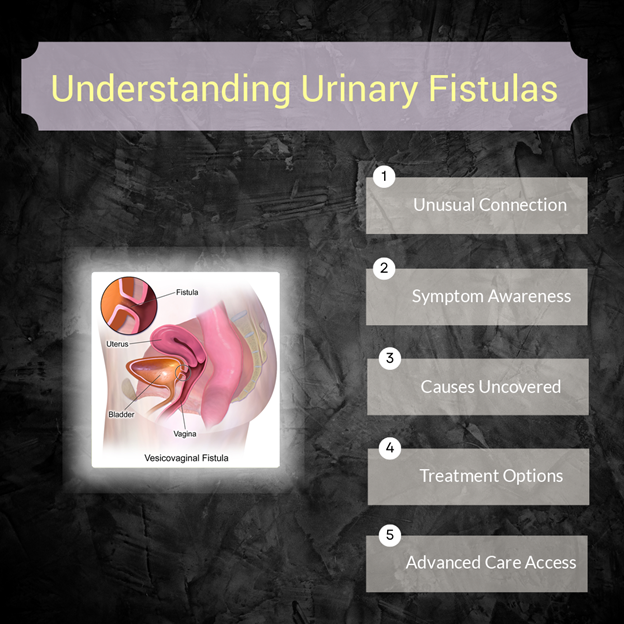Urinary fistula sounds complex, but understanding it is crucial for public health. It refers to an unusual connection between your urinary system and another organ or skin. This condition can lead to very inconvenient and sometimes severe symptoms. By gaining insights into what causes these urinary fistulas and how they affect the body, people can find effective treatment options. Moreover, access to advanced care solutions, such as those available at Hyderabad Urology and Andrology Hospital, can make a significant difference in managing and curing this condition.
Unveiling the Anatomy: How Urinary Fistulas Occur?
To grasp how a urinary fistula develops, let’s first look at the urinary tract. Your kidneys filter waste from the blood, creating urine which passes through ureters to the bladder and exits via the urethra. Normally, this process is seamless. However, a urinary fistula occurs due to damage which connects this system to another organ.
This damage could stem from surgery, infection, or trauma. For instance, a complex surgery like a hysterectomy might inadvertently harm nearby tissues, leading to a urinary fistula. Similarly, accidents or severe injuries can also be culprits. Real-world cases, such as those shared by patients at Hyderabad Urology and Andrology Hospital, underscore how diverse the pathways to developing a urinary fistula can be.
Causes and Risk Factors for Urinary Fistula Formation
Various events can lead to the formation of a urinary fistula. Surgeries involving the bladder or reproductive organs sometimes inadvertently cause this condition. Additionally, physical trauma from an accident can create such complications. Infections, including those that cause inflammation, particularly in areas around the urinary system, also trigger these fistula formations.
Other causes could be medical treatments like radiation therapy, as this powerful treatment targets cancer but can sometimes harm nearby tissues. Additionally, rarer causes include congenital defects or birth anomalies. Diseases that cause inflammation, such as Crohn’s disease, can likewise form urinary fistulas. Early diagnosis and personalized care at specialized centers can significantly lower such risks.
Recognizing the Symptoms and Impact on Daily Life
Identifying urinary fistula symptoms early can improve treatment outcomes. Common signs include continuous urine leakage, even beyond typical urination. People may also experience frequent urinary tract infections due to the presence of unusual pathways. Such symptoms are not only physically uncomfortable but also entail significant emotional and psychological challenges. Individuals may feel embarrassed or stressed, impacting their daily lives.
Thus, quick detection is vital. The impact of a urinary fistula is not merely about physical discomfort. Periods of uncontainable leakage or infection can lead to feelings of self-consciousness, making social occasions daunting. However, under the guidance of specialized clinics, these symptoms become much more manageable.
Diagnosing Urinary Fistulas: Navigating Medical Assessments
Detecting a urinary fistula often requires a few assessments. Initially, a doctor performs a physical examination, looking for clues. Imaging tests such as MRI or CT scans uncover hidden connections. Furthermore, a cystoscopy—a simple, non-invasive procedure—can visualize the inside of the bladder to detect abnormalities.
Precision is key in these processes. Therefore, consulting expert urologists is highly recommended to ensure an accurate diagnosis. Non-invasive tests offered by healthcare leaders like Hyderabad Urology and Andrology Hospital provide a comfortable experience and effective diagnosis strategy.
Treatment Strategies: From Traditional Approaches to Modern Solutions
Urinary fistula treatments can vary, often customized to an individual’s specific condition. Options include conservative management, where small urinary fistulas sometimes heal themselves with rest and temporary catheter use. Surgery might be needed for larger or complicated cases, aiming for repair or closure of the fistula connection.
Moreover, modern solutions such as minimally invasive techniques have revolutionized care. Specialized facilities like Hyderabad Urology and Andrology Hospital offer cutting-edge treatments. Such advancements help those affected by urinary fistulas achieve better outcomes with shorter recovery times. Highlighting these innovative approaches, success stories from treated patients demonstrate the power of swift action and expert care.
Emotional Wellness, Prevention, and Ongoing Care
Living with a urinary fistula involves more than physical symptoms; emotional support plays a crucial role in healing. Encouraging friends or mental health professionals to guide affected individuals fosters coping strategies. Yet prevention also matters. Adopting balanced lifestyles, maintaining hygiene, and regular medical check-ups can lower your chances of developing a urinary fistula.
Ongoing care remains significant even post-treatment. Patients benefit immensely from regular follow-ups to ensure successful healing and prevent recurrence. Hyderabad Urology and Andrology Hospital provides comprehensive follow-up and monitoring services, ensuring long-term well-being for their patients.
Conclusively, understanding everything about urinary fistulas, from causes to care, empowers individuals to pursue the best health outcomes. Following the discussed pathways of treatment and prevention, along with emotional support, paves the way for improved quality of life.


